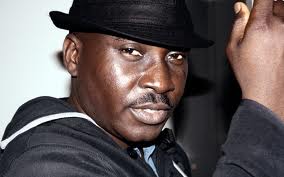Interviewed by Steve Rowland
Wole Oguntokun, director of Renegade Theatre’s “The Winter’s Tale” at the Shakespeare’s Globe. Part of The Globe to Globe International Shakespeare Festival.
Wole Oguntokun’s career as a major producer, director and writer has spanned more than a decade.
The recipient of an award for artistic excellence from the National Association of Nigerian Theatre Arts Practitioners in 2012, he directed his play, ‘The Waiting Room’ as Nigeria’s first-ever entry at the Edinburgh Festival Fringe in Scotland from the 1st until the 26th of August 2013.
Wole also directed Renegade Theatre’s production of “The Winter’s Tale” as part of The Globe Theatre’s Shakespeare Olympiad in the United Kingdom on the 24th and 25th of May 2012. In this once-in-a-lifetime theatre fiesta, 37 international theatre companies from all over the world presented a Shakespeare play, each in its own home language at the Globe in London. “The Winter’s Tale”, the only West African entry, was presented in the Yoruba Language.
He has directed a play in each of the last four annual editions of the Lagos State sponsored- Black Heritage Festivals – Aime Cesaire’s ‘A Season in the Congo’ in 2010; his play, ‘The Waiting Room’ in 2011, Marco Martinelli’s ‘Moor Harlequin’s 22 Misfortunes’ in 2012 and in 2013 , another play of his, ‘Oshodi Tapa’.
Friday, May 25th, 2012 London.
Rowland: Were you familiar with the play before here?
Oguntokun:
I’ve seen it before, in Stratford-upon-Avon I saw a production there by the RSC I think, and I thought it was massive. So when opportunity came I was asked to choose I thought let me try The Winter’s Tale my way and that was it.
Rowland: And how long would it take you to develop your way?
Oguntokun:
It came is stages, it came in stages. I had a look at it and we actually read it in English first then it was translated.
It had been translated but we read it in English first the cast and the crew. And then we tried to get an understanding of it in English then we read the Yoruba translation. And then I thought this is a bit meek in Yoruba you know two kings, who are those kings? I made them gods and I turned the story round a bit, and they – they all appear on stage and that was it.
Rowland: So tell me about it. A lot of times when people produce Shakespeare plays, they want to be as faithful to every word in the play as possible. And then in this festival lots of people that have come, all of the companies have come had done adaptations in including a lot of their own culture. How did you approach that?
Oguntokun:
Yes I wanted I wanted to – I mean what’s the point of serving the same fair to The Globe, the scene by scene, making The Winter’s Tale. Who knows hundreds of times, I thought it would be best to tell it our way particularly because they wanted it in Yoruba.Then I thought that we went open, make them gods, those two kings, and make the work because we – there is already was a ready-made story.
It struck me later on as I looked at it I thought it was – and then it was a bit – I thought it was a bit ambitious of me to make them two gods I thought so at first. But then I just gritted my teeth and said you know I’ll take whatever flack it comes with it, I’ll do it this way. And that’s how probably a goddess Hermione becomes Oya.
Rowland: Now they are now these are gods from Nigeria culture?
Oguntokun:
Yoruba culture actually.
Rowland: Can you explain tell us a little bit about it?
Oguntokun:
Shango, who we made Leontes as a god of thunder, he ruled as a man he was a king you know. He ruled as a man and he was – when he died he was well they say – some people say he didn’t die, some people say he went and he you know he just tied a noose and hanged himself and all. So Shango is the god of thunder, Ogun is a god of iron and a god of war. The instruments of warfare are always made of iron so they called him a god of war, that of a blue cloth.
Even their dressing signified who they were, and Oya is the goddess of the whirlwind she is a – her devotees consider here essential goddess, something like a Venus like that. All I did that also because also in some way, short similarities within cultures, god Shango could be Thor the naughty god. You know even with the hammer thing he carries – he carries an axe, Shango carries an axe Thor carries a hammer and you know I just thought we’d play with it a bit yeah.
Rowland: Did you just change the names or did you actually change a little bit of the story?
Oguntokun:
Also after we changed, after I decided, after the decision came they would be – they would be gods that the part of a pantheon and of our own gods of our mythology, then we had to make the story suit those gods. We have to tell their story, so then and the things they would do are – for example I mean they say, you know a bear came out and tore Antigonus.
But we don’t have bears back home yeah and that it would be more likely that someone will come and club him in the head or something. So he we brought – we suited rest of the story the chant, our chant of – sometimes Shango who was known for his fierce temper is enraged and then you know the chant comes and tries to appease him. Those are things that are peculiar to those gods, there was a story we have framework. Of and they have that problem of it too, Shango and Ogun reputed to have that problem.
Shango seducing Ogun’s wife and marrying her, that’s the original that’s the story some of us have back home there. So we thought yes there’s always been this problem with Oya. As a also source the of altercation between Ogun and Shango and the Winter’s Tale was a ready-made platform. So I thought yeah it would work, it just came one day.
Rowland: How important is theater in Nigeria and why is this your chosen path of communication, why the theater?
Oguntokun:
Okay I got the first degree in law from the Obafemi Law University and then I went to law school. That’s how we do it back home. And I was called to the bar was barrister and solicitor, it’s unified there I think unlike here. Then I went and got a master’s degree in law and then got another master’s degree in humanitarian and refugee studies. What I had always wanted to do was this, to practice theater. And when I became really serious on it, really serious about it, I couldn’t find the infrastructure necessary to do what I wanted to do.
So I had to kind of devise my own way, stage plays art. The Muson Ccenter, back in Lagos, I staged plays in at Muson and then after a while I got the opportunity to stage plays at the Terra Kulture and I began to stage plays weekly which hadn’t been done in many many. Hadn’t been done in decades, I staged real plays weekly and I had this. It went uninterrupted for years for more than three and a half years.
So yeah theater by some is considered a – some say it’s not everybody that does theater back there home. There a lot of theater professionals who work in banks now and they work – they are everywhere else in oil companies, everybody just takes off. Because there is no – I came here and I found the Royal Opera House. Sometimes, I mean a couple of years ago, it had a revenue of 90 million pounds. 30 million from the governments, 30 million from its benefactors and 30 million that it gets through its own devices and that is mind boggling.
I don’t even think about it because something will snap, so that’s the kind of we don’t have that, there are no art grants. My art grants, my friends are my art grant you know, that’s the way it’s always been. I do not know, someone asked me a question about – they asked and said, “What advice would you give – would you give about any theater makers?” and I said you know you go to the edge of a cliff.
Don’t be afraid don’t be afraid, that’s at the edge of a cliff. I mean you go to the edge of a cliff and then jump. You know someone something might catch you, but there’s also the chance there might be nothing at the end. I suppose it’s what you are called to do for me it’s kind of – its kind of I don’t know how to describe it. I think I’m called that’s what I think it’s the only way I’ve been able to – it’s the only way I’ve been able to continue. I think this is what I – this is what I’m meant to be doing, it’s been very hard. You know people send students, excellence post-secondary students, to ask me how I do theater and how I’m able to continue.
I tell them stuff but I really don’t know, you know I really don’t know. It’s just gone on, it’s just gone on for many, many years now and – okay it’s a bit like coming to The Globe. You know how does it happen to me? I don’t ask questions I just keep quiet and stay, you know I just continue. So but this is what I do and it’s always kind of worked out for me even though sometimes it’s been very hard.
Rowland: What is your message, what is your hope in being a theater practitioner in terms of the – what you are communicating to your audience. Are you trying to discuss issues that are contemporary in Nigerian society, are you trying to entertain people, what’s your hope?
Oguntokun: My intention is to artistically enhance every life I come in contact with. And artistic enhancement now might be me telling you showing you the other side, there’s a – the world isn’t – the world is full of stereotypes you know people thinking strange things about other people.
You know, I’d like to do theater that goes beyond borders, that tells you know people really are one. And Leontese and Polixenes could be two men from any part of the world struggling over a woman’s love you know. That’s what I’d like to do with my theater. I do theater because I want to tell good stories and make people feel good that’s the mission. A lot of my theater reflects contemporary things back home as well and we have a lot to be worried about. My country has a local class system there of lack of satires over military in governance. You know, I have a couple of plays that are texts in schools, but the idea is to touch human lives, that’s the idea. The idea is to improve lives if I can.








Comments